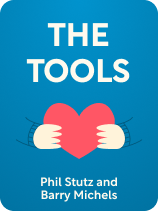

This article is an excerpt from the Shortform book guide to "The Tools" by Phil Stutz and Barry Michels. Shortform has the world's best summaries and analyses of books you should be reading.
Like this article? Sign up for a free trial here.
Why is self-acceptance important? How can you accept yourself, flaws and all?
It can be difficult to step out of your comfort zone if you’re insecure about who you are. Phil Stutz and Barry Michels explain that to overcome debilitating doubts about yourself, you need to accept all of your negative attributes and transform them into strengths.
Below, we’ll explain why embracing what you least like about yourself helps you overcome social anxiety.
Why You Should Accept All of Yourself
By becoming vulnerable with yourself and others about your strengths and weaknesses, you’ll stop wasting energy on hiding insecurities and redirect it toward performing better in your daily life. That’s the essence of why self-acceptance is important. For example, if you’re insecure about your struggle with technical tasks at work, but you have a talent for building positive relationships with coworkers and clients, you could have an honest conversation with your boss about your skill set. As a result, they might move you into a more communication-focused role. This will allow you to focus your energy on what you do best, rather than worrying about the inefficiency of your work elsewhere.
(Shortform note: In Strengths Based Leadership, Tom Rath and Barry Conchie argue that leaders should be open about their strengths and weaknesses. When you’re honest with yourself about your abilities, you can devote more time and energy to what you do well and build a supportive team around you to fill in for your weaknesses. When you and everyone on your team are performing roles you’re well-suited for, you’ll all feel more confident. Research Rath and Conchie cite suggests that when you feel confident about your work, you’ll be healthier, happier, and more productive.)
Accepting yourself helps you feel confident to express your true thoughts and feelings, which improves all of your relationships. When you’re in touch with your deepest thoughts and feelings, you’re able to express yourself to people more honestly and clearly. This will help you make others feel more appreciated and allow them to be more openly expressive with you, leading to stronger connections.
(Shortform note: Sharing your honest feelings won’t just improve your existing relationships—it can also help you attract a supportive community of like-minded people. In The Upside of Stress, Kelly McGonigal says you can attract meaningful relationships by being honest and open about the things you personally struggle with. For example, if you struggle with anxiety, start a social media group that discusses anxiety. Doing this will help like-minded people feel heard and comforted, which will ultimately attract the right people to you.)
How to Accept Yourself
When you feel performance anxiety, imagine an embodiment of your negative attributes standing next to you. (The authors call this your shadow, but we’ll refer to it as your “dark side.”) Whatever manifestation you choose, make sure it’s personal. What’s important is that you feel its presence. For example, if you’re experiencing imposter syndrome at a new job, you might envision your insecurity as a nervous dog.
Focus on this embodiment of your negative attributes and imagine it working with you as an ally. By doing this, the authors say, you’ll tap into the universal power of personal truth. Embodying your personal truth means acknowledging your true thoughts and feelings—positive and negative—and then allowing yourself to express them wholly. Once you’re partnered with your dark side, turn your attention to whatever audience you’re anxious about engaging with and internally demand their attention. The authors explain that doing this should fill you with confidence and help you communicate more clearly. For example, suppose imposter syndrome at a new job has kept you from feeling confident enough to speak your mind at company meetings. In that case, you might imagine yourself picking up the nervous dog that represents your insecurity and comforting it. You’d then picture yourself and the dog together calling for the attention of your audience.

———End of Preview———
Like what you just read? Read the rest of the world's best book summary and analysis of Phil Stutz and Barry Michels's "The Tools" at Shortform.
Here's what you'll find in our full The Tools summary:
- What it means to reach your full potential
- How to embrace pain—and why you should
- Why gratitude matters and how to let it guide you






